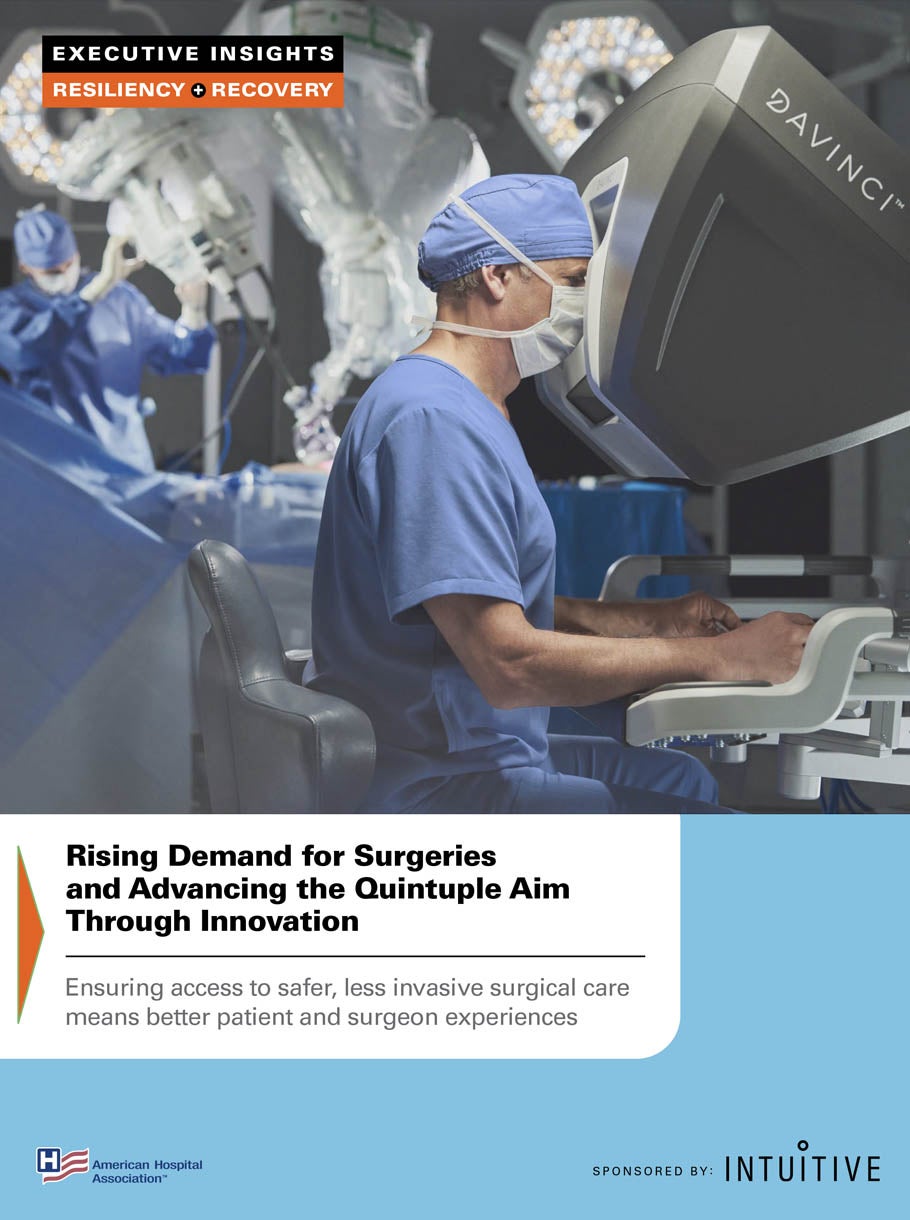
Rising Demand for Surgeries and Advancing the Quintuple Aim Through Innovation

Rising Demand for Surgeries and Advancing the Quintuple Aim Through Innovation
AHA Knowledge Exchange
Ensuring access to safer, less invasive surgical care means better patient and surgeon experiences
With the growing demand for surgical care, health care organizations are turning to innovative technology to help achieve the goals of the Quintuple Aim: to improve outcomes, lower the cost of care, provide a better patient experience, enhance workforce engagement and advance health equity. Artificial intelligence (AI) is a present-day game-changer in surgical care by enhancing surgeon capabilities; supporting informed, real-time decision-making; and improving the efficient delivery and quality of care to achieve more positive outcomes for patients, surgeons and care providers. This executive dialogue explores how hospitals are integrating information from different technologies — AI, robotics, visualization, EHRs, backbone systems and equipment to optimize surgical and perioperative performance.
10 Ways Hospitals Can Integrate AI and Automation into Surgical Care
- Pilot surgical optimization software to make intelligent decisions that support better staffing, scheduling and patient flow to unlock capacity in operating rooms.
- Integrate information from different technologies — electronic health records, backbone systems, equipment technologies and robotics — for insights to improve quality and efficiency.
- Use AI to know your own truth — by extracting, analyzing and synthesizing patient encounter data, looking for trends, outcomes and evidence-based reporting on what procedures work best.
- Provide surgeons real-time information about their cases, procedure times and instrumentation usage with objective performance indicators and feedback for improvement.
- Provide the means to learn with a touch-enabled device that allows you to record video and have case observations to reduce variation and standardize the techniques.
- Enhance surgical training and optimize the care team with extended reality technology, making real-time training easier and more scalable between surgeries and between cases.
- Employ integrated intelligence and a phased approach to quality improvement and compare to national benchmarks.
- Standardize the electronic consent process to improve patient-centered care.
- Examine the surgical optimization clinic criteria with AI to determine which patients truly benefit from going through that program.
- Customize a surgical-site infection predictor tool to positively impact patient outcomes.
Participants

Cary Gibbs, MSN, R.N., AGCNS-BC, CNOR
Director of Perioperative Services
Hendricks Regional Health

Jason Hart, MBA
Vice President of Marketing, U.S. and Canada
Intuitive

Kim Kerr, M.D.
Chief of Surgery
Hendricks Regional Health

Josh Kooistra, D.O.
Senior Vice President, Chief Medical Officer
Corewell Health West

Traci Lavigne-Milnes, R.N.
Director, Perioperative Services
St. Joseph Hospital

Andrea Leslie, MSN, R.N., NE-BC
Interim Senior Vice President, Hospital Operations
Corewell Health West

Gregory Mancini, M.D., FACS, FASMBS
Vice President, Perioperative Medicine Center of Excellence
University Health System

Barbara Matias, R.N., MSN
Director of Surgical Services, West Kendall Baptist Hospital
Baptist Health South Florida

Nate Ortiz, MHSA
Chief Operating Officer, Baptist Hospital of Miami
Baptist Health South Florida

Griselle Pastor, DNP, MBA, R.N., NE-BC
Assistant Vice President of Nursing, Doctors Hospital
Baptist Health South Florida

Irene Richardson
CEO
Memorial Hospital of Sweetwater County

Moderator:
Suzanna Hoppszallern
Senior Editor
American Hospital Association
AHA Knowledge Exchange
Gain insights from the C-suite and health care leaders on the most pressing issues and transformational strategies.
Explore the Series







